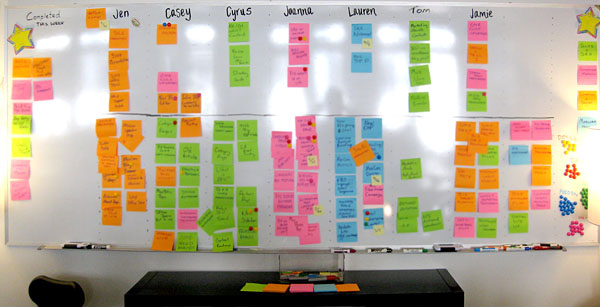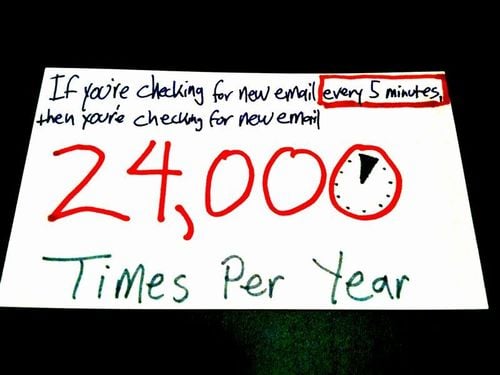Project Management for SEO (2012 Edition!)
The author's views are entirely their own (excluding the unlikely event of hypnosis) and may not always reflect the views of Moz.
So here's the truth - I used to suck at project management. But over the years I've determinedly turned myself into a half-decent project manager. Why? What was the driving force?
Project Management Is A Tool For Effecting Change
At the end of the day, I never have and still don't care that much for project management. But what I do care deeply about is effecting change. Driving action and results instead of talk and documentation. You can see my drive for getting things done in this whiteboard friday:
(Note, if you have thoughts about this video you'd do well to read my follow-up comment about the difference between reports and reportings.)
Although there are many ways of affecting change, project management is a crucial part of it. Below I'm going to outline a bunch of tools, tips, and tricks that we've discovered and implemented over the years at Distilled to get better at project management:
Project Collaboration - Trello
Personally I'm not a fan of clutter, either physical or virtual, and so I love technology that gets out of the way while you get on with getting shit done. I've tried lots of different project management solutions, and Trello is the first one I've fallen in love with. For those that saw the whiteboard friday I did with Jamie about a year ago it models the real life post-it note system very well:

I'm going to let Will explain why he likes it so much:
And I'm going to let Paddy break down the details in his blog post Using Trello to Manage SEO Projects.
Project Collaboration - Google Docs
A lot of you will already be familiar with Google Docs. Of course. But only recently have I come to realize the extreme power behind the collaboration elements. I've always hated track changes in Word and finally Google Docs has something better to offer. This video, although cutsey, actually demonstrates the power of real time collaboration:
In particular, two features that are really making me excited are in-line comments (with easy replies and notifications) and revision history (which allows you to see when, how, and who edited a document).
We use Google Docs extensively within Distilled to craft and send around documents even if ultimately we deliver the final report as a .PDF or some other format. After all, some large corporations still like the smell of .PDFs in the morning....
Inbox Zero Methodology

I can't explain how much of a life changing experience the inbox zero methodology is. For the modern day information worker, inbox zero is fundamental to happiness and productivity. If you're not using the inbox zero system then please trust me when I say it'll change your life. Here's Merlin Mann talking about the original system at Google:
When new employees start at Distilled, we coach them in the ancient ways of Inbox Zero. Although it's a personal revelation for many (myself included), the real power comes when you have an entire organization that is GOOD WITH EMAIL. Having seen a peek inside companies that are not so efficient with email the difference is night and day.
Our Consultants Work On-site Where Possible
Life is organized chaos. Sometimes not so organized either. Project management is similar in that it's often more chaos than management. There's only so much you can really and truly work to get things done without being in the thick of it.
So, where possible, our consultants aim to spend some time on-site with our clients. The increase in results is striking. Not only are we better able to communicate our ideas, but we are also better placed to understand how the client's business works - not just the business model and mechanics, but communication, project management, hopes, and fears.
The best substitute for this if you're not able to get face-to-face with the client is to at least communicate often with many different points of contact within the client's organization. This improves the chances that you'll understand the real needs of the client as well as ensure that as many people as possible like you which is important for getting things done!
Communication Solves All Problems
We have various memes within Distilled; you can read more about them in a post I wrote for Dharmesh a little while back called Startup Culture Memes - Do You Have A Duck Of Awesomeness. One of the ones I'm most proud of is the mantra "communication solves all problems". I'm constantly amazed at the ability to solve problems by communicating effectively. Either talking to other members of the team or talking directly with the client - just having some real interaction (face to face or on the phone ideally) and explaining the situation clearly solves 99.9% of all problems.
This mantra has infiltrated all parts of Distilled, but I see two key ways that this affects project management on every project.
At the start of any project, we have a kick-off meeting which has two clear outcomes; the first is a top to bottom understanding of the client's business, and the second is a detailed understanding of what the project is going to look like. Mark wrote up our project kick-off process in a little bit more detail here: How To Kick Start SEO Projects.
Secondly, I drill into people here that it's okay to miss deadlines. Really. It is. Do people really care if you deliver something on Monday morning instead of Friday afternoon? The answer is that yes, they care very much if you don't let them know. If you let them know that you will deliver it Monday instead of Friday, then in 99% of cases, they could care less. Why is this so powerful? Because a single missed deadline without communication tarnishes your perception in the client's eyes. So long as the communication is strong, the actual dates rarely matter.
PPT Pitches
PPT? As a project management tool? Well yes. Let me explain - there are broadly speaking three types of work that you do when you're consulting and there are three different tools you use for these tasks as follows:
| Activity | Tool |
|---|---|
| Research and analysis | Excel |
| Deliverables and specifications | Word |
| Pitching ideas and strategy | PowerPoint |
Although this seems like a no-brainer, it's actually a very powerful mental model. Want to take a guess where setting the project vision and goals comes in? Yep - PPT. Although you won't keep track of a project in PowerPoint, you should be crafting and creating the vision and goals for the project in PPT. Without strong vision and goals, projects will fail.
So persuading a consultant to put together PPTs at the start of projects is a powerful tool to ensure we have a clear idea of where we're going, and importantly, the client is on board.
What Works For You?
It's important to note that what works for us may not work for you. Hopefully this has been helpful for you to take a peek at how we manage projects and communication. I'd love to hear what you guys have to offer in the comments!
Further Reading
If you loved this psot and want to explore the subject further take a look at these:
- http://www.distilled.net/blog/seo/project-management-for-seo/
- https://moz.rankious.com/_moz/blog/project-management-for-seo
- http://www.slideshare.net/SarahCarling/seo-project-management
- http://searchengineland.com/why-is-project-management-undervalued-in-seo-65750
- http://seogadget.com/seo-management-good-seo-managers/



Comments
Please keep your comments TAGFEE by following the community etiquette
Comments are closed. Got a burning question? Head to our Q&A section to start a new conversation.